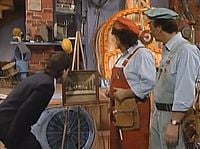The Painting
| The Super Mario Bros. Super Show! live-action segment | |
|---|---|
| "The Painting" | |

| |
| Production number | 135 |
| Airdate | November 6, 1989[?] |
| Guest star(s) | Andy Heyward |
| Cartoon episode | "Quest for Pizza" |
| Zelda preview | "Hitch in the Works" |
| << List of episodes >> | |
"The Painting" is the forty-sixth live-action segment of The Super Mario Bros. Super Show! Its corresponding animated episode is "Quest for Pizza." This episode is notable for being the only episode where Andy Heyward is a special guest in addition to being the show's creative music supervisor and executive producer.
Plot synopsis
In the middle of spring cleaning in his and Mario's apartment, Luigi notices an old painting, which Mario picks up and blows the dust off. Luigi observes the painting and explains to Mario that it could be worth something, and that they should have it appraised by an expert. Mario agrees, adding that they should then find out how much it is worth.
Later on, Mario and Luigi examine the painting, when Mario questions Luigi about who he hired to look at their painting. Luigi replies that he hired the best art expert around, Howard Stevens, who then shows up at their apartment door. Coming in, he asks the two if they are Mario and Luigi. Luigi says yes, and asks what he thinks about the painting they recently found. Howard appears to be astounded by the picture, and explains to them that their painting, The Second-to-Last Supper, was painted by Leonardo da Vinci Rooney, and is pictured as one of the rarest paintings in history. He also informs Mario and Luigi that the painting had disappeared nearly 300 years ago. After Da Vinci Rooney painted it, one of his students, Leonardo da Vinci, plagiarized his work and painted The Last Supper. Howard then ends his speech notifying that one day the painting disappeared without a trace, under the assumption that it was lost forever, and that it is worth over one hundred zillion dollars, thrilling the two brothers. Excitedly, Mario then asks Howard if he knows the value of the frame.
Amazed at their new fortune, Mario and Luigi come up with ideas of what to do with the hundred zillion dollars, including baking the world's largest pizza. Howard reminds them to think big, assuring them that they might even appear on his show one day, Lifestyles of the Poor and Unknown. Upon further examination, however, Howard states that the painting is not worth 100 zillion dollars. Luigi responds that they will simply settle for one zillion, as Howard explains that the painting is worthless, as it was actually painted by an imposter, Leonardo da Vinci Mahoney. Howard is able to identify it as Mahoney's work, due to one of the people in the painting being Mahoney's uncle, Roy Orbisoni Mahoney. In the end, Howard ends up buying the frame for seven dollars, much to Mario and Luigi's satisfaction.
Dub edits
- In the German dub, Howard does not refer to The Second-to-Last Supper by name, instead simply referring to it as "one of the oldest paintings in the world."
- In the Latin American Spanish dub:
- The examples Howard gives after deducing the painting to be a fake are different between the original and the dub:
- In the dub, Howard claims Mario and Luigi could not trade the painting for a Mickey Mouse stamp. In the original, he says they could not trade it for a bag of empty aluminum cans.
- In the dub, Howard claims that people would pay nothing for the painting. In the original, he says it would be worth nothing as a bribe to go backstage at a B. J. Thomas concert.
- In the dub, Howard claims that the painting could not be traded for a terrible painting. In the original, he says it could not be traded for a Pong arcade machine.
- Howards offers the Mario brothers nine dollars instead of the original seven for the painting.
- The examples Howard gives after deducing the painting to be a fake are different between the original and the dub:
Names in other languages
| Language | Name | Meaning | Notes |
|---|---|---|---|
| German | Das Gemälde[1] | The Painting | |
| Italian | Il Quadro[?] | The Painting | |
| Portuguese | O quadro[2] | The painting | |
| Spanish | La pintura[3] | The painting |
Trivia
- Lifestyles of the Poor and Unknown is a parody of the American television series Lifestyles of the Rich and Famous.